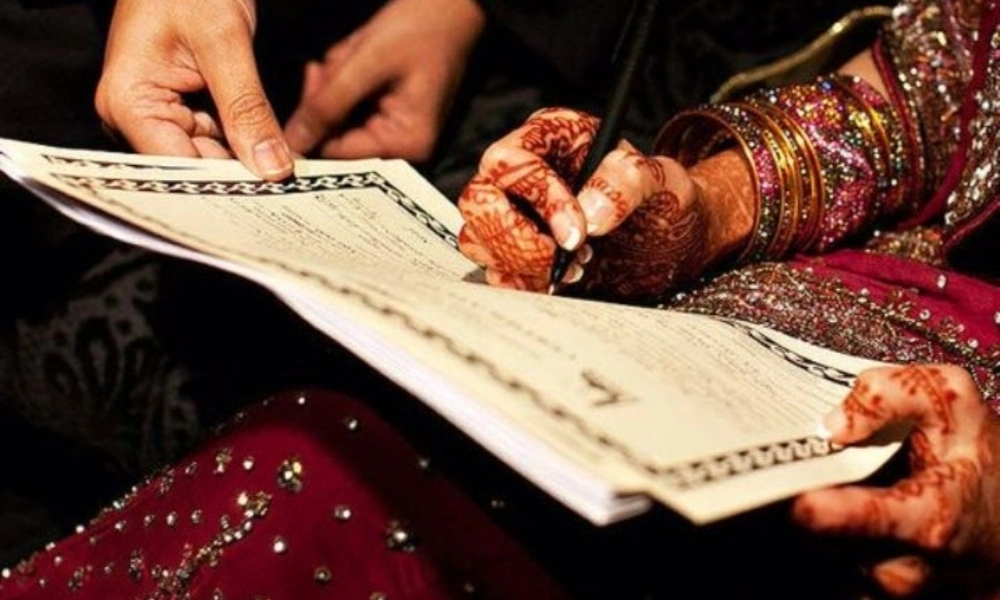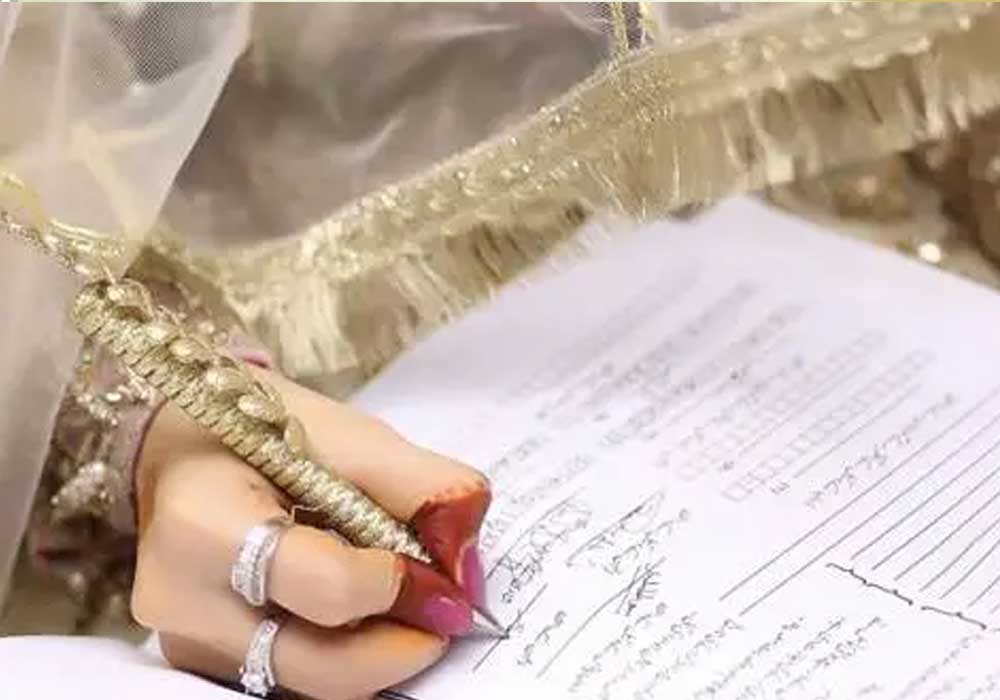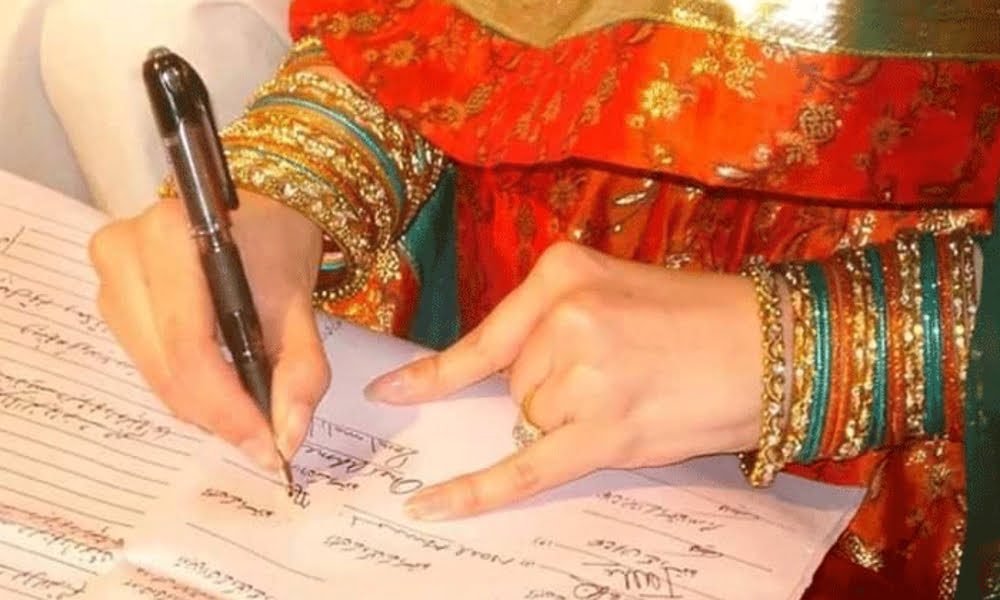News
Perception Gap: Majority of Registrars Believe Brides Face Challenges In Negotiating Nikahnama Terms

Nikahnama Terms: A recent research study focusing on women’s marriage rights brought to light some concerning findings regarding prevailing attitudes and practices among nikah registrars (NRs) in Lahore.
The study, unveiled on Tuesday during the launch event of the “Diagnostic Study of Nikkahnamas in Punjab: A Review of Women’s Marriage Rights,” shed light on several important aspects.
The study, a collaborative effort between the Centre for Human Rights (CFHR), Musawi, and the National Commission for Human Rights (NCHR), aimed to comprehensively assess the state of women’s marriage rights.
Specifically, it sought to identify gaps within the existing legislative and institutional framework that hinder women’s full and effective access to and realization of their marriage rights in Punjab.
Based on an in-depth analysis of 1,100 nikahnamas, along with interviews conducted with 105 NRs across 14 union councils in two pilot districts—namely Lahore and Pakpattan—during the period of 2020-2021, as well as an examination of pertinent legislative and implementation frameworks, the study highlighted several significant issues.
One particularly alarming observation was that a staggering 86% of nikah registrars in Lahore held the belief that brides were inadequately equipped to negotiate the terms outlined in their nikahnamas.
Furthermore, an overwhelming 85% of NRs expressed the opinion that granting women the authority to initiate divorce through the nikahnama would lead to an increase in divorce rates.
Additionally, an astonishing 92% of NRs opined that a wife’s entitlement to maintenance was contingent upon her obedience to her husband.
Among the key concerns brought to the fore by the study were evident deficiencies in the enforcement and implementation of existing laws, such as the Punjab Muslim Family Laws Amendment of 2015, which explicitly forbids the alteration or omission of sections within the nikahnama.
Moreover, the study underscored the vital role that perceptions, beliefs, and understanding held by NRs concerning marriage rights and legal matters played in shaping the outcomes.
This was compounded by limited oversight and accountability mechanisms for NRs.
Furthermore, the study drew attention to the inadequate grasp of marriage validity and inconsistencies within the nikahnama’s structure, format, and clauses, all of which collectively impacted the accessibility of fundamental marriage rights, particularly for women.
Understanding Marriage Rights and Misconceptions: A Comparative Analysis of Nikahnamas in Pakpattan and Lahore
In the context of Pakpattan, the study findings reveal some striking statistics regarding the inclusion of essential information in nikahnamas.
Specifically, the bride’s CNIC (Computerized National Identity Card) details were absent in 58% of the nikahnamas examined, while the age of the bride was not recorded in 23% of cases.
A mere 8% of nikahnamas encompassed the provision for a monthly allowance, and an even smaller 2% granted the wife the right to initiate a divorce.
Upon surveying nikkah registrars in Pakpattan, a noteworthy 60% indicated that they regarded consent given under duress as valid for the purpose of marriage.
Surprisingly, 58% of nikah registrars held the belief that the Haq Mehr—a compulsory payment from the husband to the wife upon marriage—was not an obligatory condition for a legally valid nikah.
Furthermore, a notable 6% of registrars were of the opinion that child marriage is legally permissible if authorized by a guardian, and a significant 40% opined that the Haq Mehr did not solely belong to the wife as her property.
Additionally, a substantial 78% of respondents believed that a woman’s right to work was contingent upon the husband’s permission, and a majority of 61% thought of khula—a woman’s right to initiate divorce—as not being an independent entitlement for women seeking divorce.
Shifting the focus to Lahore, similar gaps in documentation were observed, albeit at different magnitudes. Here, the bride’s CNIC details were absent in 15% of nikahnamas, and 26 nikahnamas lacked a dedicated column for CNIC information.
In nine instances, the bride’s age was omitted, and 31 nikahnamas deviated from the standard format.
The inclusion of provisions for a monthly allowance was found in only 9.7% of nikahnamas, and a mere 3% granted the wife the authority to initiate divorce.
Upon conducting a survey among registrars in Lahore, a substantial 67% of respondents indicated that they believed a woman’s right to work was subject to the husband’s consent.
An interesting 26% considered the consent of a guardian to be more significant than the bride’s independent free will.
An overwhelming 83% of respondents did not consider the Haq Mehr to be a mandatory requirement for a legally valid marriage, while 55% believed that the Haq Mehr did not exclusively belong to the wife.
Moreover, a significant majority of 64% of nikah registrars held the view that Khula was not an independent right for women seeking divorce.
In summary, the study’s findings illuminate concerning patterns in both Pakpattan and Lahore, reflecting varying degrees of gaps and misconceptions surrounding key aspects of marriage rights and obligations.
The inclusion of critical information in nikahnamas, the perception of consent, and the understanding of essential marital rights collectively underscore the need for greater awareness, education, and legal clarity within these contexts.
NCHR Chairperson Rabiya Javeri Agha Stresses Study’s Role in Enhancing Awareness of Women’s Marriage Rights
Tahera Hasan, a distinguished lawyer specializing in family law, highlighted that the preservation of women’s marriage rights is hindered not by a lack of legislation, but rather by the cultural and social barriers that impede the realization of these rights.
Musawi Fatima Yasmin Bokhari, the CEO, stated, “The nikahnama serves as the initial platform for discussions on women’s marriage rights. When comprehended and completed correctly, it establishes crucial safeguards for women.
Our scrutiny of Nikkahnamas has exposed that many of the crossed-out columns pertain to women’s rights, such as monthly maintenance and the wife’s delegated right to initiate divorce.”
Sevim Saadat, the study’s author, underscored that the absence of key information in the Nikkahnama has far-reaching implications for the enforcement of the law.
For instance, when details like the bride’s age or CNIC are omitted from the Nikkahnama, there is a grave concern that the marriage might involve underage individuals.
Lahore High Court’s Justice Jawad Hassan Affirms Nikahnama’s Significance
MNA Mehnaz Akbar Aziz highlighted the study’s importance, stating, “This study holds significant weight as it scrutinizes a document, the Nikkahnama, which often goes unexamined.
However, it holds the power to shape the destinies of individuals, families, and subsequent generations.”
Provincial Minister of Women Development in Sindh, Shehla Raza, stressed that the nikahnama can play a pivotal role in preventing the illegal practice of child marriage. She emphasized the need for the strict implementation of child marriage laws.
These statements collectively underscore the critical role of the nikahnama in shaping women’s marriage rights, necessitating a comprehensive understanding and implementation of its clauses to ensure the protection and empowerment of women within marriages.
RELATED CTN NEWS:
IHC Rejects Immediate Suspension Of Imran Khan’s Sentence In Toshakhana Case
Chinese CDC Reports: Mpox Cases Soar To 491 In July, 96% Tied To Male-to-Male Activity































